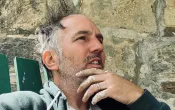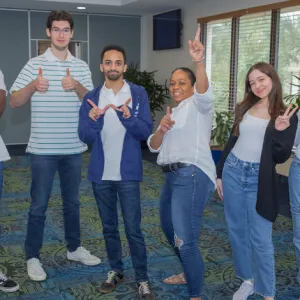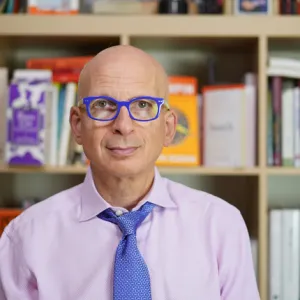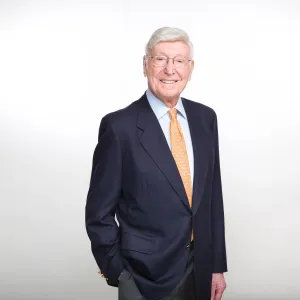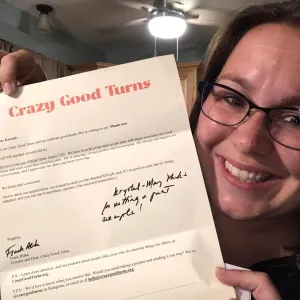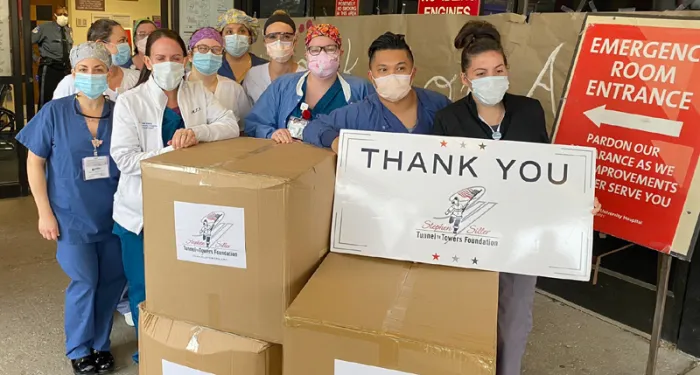
The Fight Against COVID-19
Meet 6 remarkable people leading organizations that are meeting the enormous demands caused by COVID-19 in generous, creative, and crazy good ways.
In order to endure, we must embrace change — even when that change is unpleasant or hard.
COVID-19 has changed nearly every facet of life in some way. People are still adjusting to this new normal, and will be for months or perhaps years.
The people we've featured on Crazy Good Turns are no exception. With new and more urgent needs erupting daily, many of the amazing organizations we have featured to date are changing the work they do in order to meet those needs in generous, creative, and crazy good ways.
FRANK BLAKE: First up is Frank Siller of Tunnel to Towers.
Tunnel to Towers were guests on one of our very first episodes. They draw their name from Firefighter Stephen Siller, who ran on foot from the Brooklyn Battery tunnel to the World Trade Center, where he lost his life while trying to save others on September 11, 2001.
In the years since, Tunnel to Towers has served those who pay the greatest cost while serving, providing homes and other financial support to severely wounded veterans. They also assist the families of military service members, police and firefighters who lose their lives in the line of duty.
Here, Foundation founder and director Frank Siller talks about how the COVID19 outbreak has redrawn battle lines and placed healthcare workers at the forefront of the fight — and how Tunnel to Towers has expanded its mission in order to meet that reality.
FRANK SILLER: We were doing our regular work and lo and behold, in late January, early February, we're all getting a feeling for what was going on with the coronavirus. There was a great panic here in New York.
As a matter of fact, the governor was and the mayor both was saying it's really not going to affect us much. As a matter of fact, the mayor said, "Go out on Chinese New Years and you could be in town, don't worry about it, take the subway." It wasn't any great fear until the fear really hit.
I have nephews and nieces that are nurses. I have my daughter-in-law who's a nurse working in Cornell on the front line. She works in MICU, so she works right in there. The medical intensive care unit.
When I started to hear from my daughter-in-law how bad it was at the hospital she worked at. And when I started to hear from my nephews and nieces how bad it was, how many people will come in that were so sick and they just never dealt with it. Then the fear and panic came in of, are we going to have enough equipment?
My daughter-in-law was wearing one mask all day and then was told to save it or clean it so they could use it another day. Now that is something that they never had to do before.
I started to say, "Oh my God, this is very, very serious."
When I realized that, I said, "It's time for the foundation, Tunnel To Towers Foundation, to do the right thing again."
That's when the foundation realized that we had to buy this equipment to help protect our frontline healthcare workers, and we did.
We were purchasing hundreds of thousands of masks and distributing to different hospitals throughout New York. We called all the hospitals to see if they needed the mask or didn't and most of them needed it and we delivered it. Now we're getting more equipment in almost every day and as soon as we get it, we send it right out.
Listen, our foundation Tunnel To Towers Foundation, we pay off mortgages for our military and our first responders who die in the line of duty that leave young kids behind. We see the difference that makes in a household.
You just lost your husband or your wife while protecting our community or our country. So it's a tremendous relief that they could stay in their house and keep their kids in the same house that they have all the memories in. Or if they didn't have a house like in our militaries to build them a house and say, "Thank you, your country hasn't forgotten the sacrifice that you made."
These frontline healthcare workers are the heroes of this sad time.
Every one of them are on the front lines of this. They go in there and they just do their job and they care about these people, and they're selfless, and they're risking their own lives. They have kids, they have their own kids and they're willing to do what our military does every single day, and our first responders do every single day, they're willing to risk their lives.
We see that difference. Therefore, we realize that it's important to make sure that we take care of these healthcare workers who die, what I call in the line of duty, that leave behind young kids.
We're not paying their mortgages off because it's just too many of them. I don't have that kind of resources, but we're paying their mortgages until I run out of money and I put $1 million on the side just for that.
It won't last long, but it will relieve some burden, a financial burden at the very least. And it'll also let people know that people care.
I think America appreciates our first responders more now than ever. Our healthcare workers are right there with them. They're right there with them. It's incredible what they have to do every single day now. They'll be appreciated, I believe, forever.
You want to help us, go to tunnel2towers.org. We're asking Americans that do $11 a month, $11 a month, $11 a month. If you could do more, do more, it doesn't matter. Just do something.
Go to tunnel2towers.org and join us on this mission to make sure that we take care of frontline healthcare workers like I said, who are willing to die for you and die for me.
We better be there America, we better take care of them, and I know we will.
Interview with P.S. Kitchen
FRANK BLAKE: We're staying in New York for this next story, which comes from April Tam Smith of P.S. Kitchen.
April and her husband Graham are investment bankers living in Manhattan, who practice what we described in our episode last season as "radical generosity." For a time Graham Smith was "reverse tithing," or giving away about 90 percent of what he earned. April, meanwhile, invested her time and money into relief trips to Haiti and other areas in need.
The two found a new way to serve when they launched the social enterprise restaurant P.S. Kitchen. Also based in Manhattan, P.S. Kitchen employs people in need of a second chance after an arrest or battle with addiction and donates 100% of profits to charity.
Like every restaurant, everywhere, P.S. Kitchen suffered a tremendous shock with the arrival of the coronavirus and the social distancing measures that followed, which forced the restaurant to close its doors. But thanks to some unexpected help from friends far and wide, P.S. Kitchen has managed to pivot to a new mission, and provide food and support for hospitals nearby. In this story, April explains what happened.
APRIL TAM SMITH: I think for all of us who live in New York, once you know something like this is going to happen, it is going to be so serious.
We're just so on top of each other. Apartment buildings, as you can imagine, even if no one goes outside, every apartment building just has so many families on top of each other.
And that happened really quickly, from, "Oh, I heard so-and-so got sick," to just the numbers that are multiplying and more and more people in your world are not feeling well, that became pretty sad and pretty scary.
How it unfolded for the restaurant was that, we actually had a group of however many came in the day before we decided to close. If any restaurants get in an unexpected group you should be happy. But that was the moment when they came in, I think it really hit me that, oh my word, that's not a good idea at all.
And we closed it literally the next day.
That day was definitely tough. I remember it very well, it was March 15 and making that decision, not really sure if it was the right decision, it was the best that I think it's … if we really want to do good, protecting those that are vulnerable in our city in this way, it's the best decision I can come up with.
But letting people go is hard, and trying to pay them for sure that week, and then the following week. It's also tough when you have 67 people on your payroll and no revenue.
I didn't even ask any of my coworkers for help or donation or anything, nor did I even really mention to them this is happening, but they can see the news and they know when they can walk by that P.S. is no longer open.
And I got a call from a colleague who just simply said, "Hey, Tammers, we know what's going on, you don't need to say anything, we have already talked among ourselves, we're all going to chip in so you don't have to worry about your restaurant. We have rallied some people and just tell us where to send the money and we've got your back."
And that's just one of the kindest things anyone's ever done for me, for them to just completely unsolicited and unexpectedly rally other people to help.
Since then, we've gotten generosity from our customer base, etc., which has allowed us not only to have a GoFundMe for our workers, that has been able to pay for people that either are still waiting for unemployment or some people who don't qualify at all, as well as sending meals a few times a week up to different hospitals to serve frontline workers.
Today is Tuesday, by the end of the week we would have delivered over 1000 meals.
I remember when we had our first initial call with New York-Presbyterian The woman who spoke to us, Caroline, was extremely kind, appreciative and she just told us, "Honestly, guys, you can send us as many as you want and there will be a need."
"Think about the fact that how many people we need to feed at the hospital and we have to do that three times a day, and we're a hospital so we never close, it just keeps going and going."
And that was when we were thinking, okay, we can really participate, we can really help.
I have always said I love the idea of generosity begets generosity, and generosity is so contagious. And I have just seen it so much through this season, the fact what my colleagues did for me in order for us to really help our workers, but then what the workers did for each other.
We literally have texts of people saying, oh, it's okay. I actually got lucky in the unemployment process, I already got my amount, or I'm good until I get it. Give it to somebody else.
And you just see people passing it on, even among the staff and then of course additionally now it's that and we as a restaurant can now be generous outwardly towards some of the hospital workers in New York City.
There's a lot of ways to help us stay alive. Coming on our social media, you can either see the GoFundMe page that serves the purpose of continuing those medical care, sending meals up to different hospitals, getting a gift card would be really huge so that we can have the funding to help us pay the rent and different things that need to happen until we're able to open back up.
It's simply www.ps-kitchen.com.
Interview with Love Beyond Walls
FRANK BLAKE: Now we head down south to the city where Crazy Good Turns was founded: Atlanta, Georgia.
Here, we find Terence Lester of Love Beyond Walls serving a population that doesn't have the option to shelter in place: People experiencing homelessness and living on the streets.
Lester is no stranger to the predicament. During Season 2, he shared the story of how he chose to live on the streets for a time so he could better understand what the experience of homelessness is like. In our recent conversation, he shared the new challenges brought by COVID-19, and how Love Beyond Walls is helping those on the streets in their fight to stay away from the disease.
TERENCE LESTER: Life on the streets for someone who is experiencing homelessness right now is very difficult. It's very hard.
Many people experiencing homelessness rely on the community of commuters going back and forth. There are people right now that we have talked to that would say, "I haven't eaten in a week because no groups have been out here to share food with us. We feel forgotten."
That started to cause us to think about the number of places that would be shut down, including churches and libraries. Sometimes libraries are used by individuals experiencing homelessness as daytime shelter, places where they can access information or use the internet and get vital and critical information for them to be able to survive.
And we just started to think, man, like if people living on the streets wouldn't have access to any of these places, then how would they get water?
I mean we kept hearing reports after reports coming from leaders and the media about how washing your hands, hand-washing, was the best way to protect yourself against the spread and contraction of the COVID-19 virus.
So that's when I had the idea that why don't we just start assembling portable hand-washing stations and installing them around the city where people experiencing homelessness would be able to at least have access to this basic necessity to wash their hands, to protect themselves from the contraction and spread of the COVID-19 virus?
And since then I had a friend named Lecrae reach out to me. Lecrae is a very known hip-hop artist and he reached out and it was around the time I had the idea. And he was like, man, is there anything we can do to serve people in a tangible way that's living on the streets?
And I told him about the hand washing stations, and he was like, "Oh this is brilliant. Let's do it." And he jumped in and he donated the first 15 and we launched this official campaign called Love Sinks In.
Since then we have 40 sinks around the city. Some are at shelters. Some are at churches that service the homeless population. Some are in encampments and underneath bridges. Some are in parks. They're scattered abroad the city of Atlanta.
But greater than that. We have also extended our reach to other cities around the country. We have hand washing stations in Birmingham, Alabama. We have 20 set up in Austin, Texas. Another 10 that's going to Dallas, Texas. We just forged a partnership with people on the ground in New York City and we're sending 25 stations there next week. We have a potential partnership that is developing in California as well as Greenville, South Carolina.
For the last five weeks I've been working 10- or 12-hour days. Up early in the morning, loving on my kids, loving on my family. But then out the door making sure that the hand washing stations are sanitized themselves, that they're upkept. And we upkeep them, ensuring that they are refreshed and filled with water.
But when we started to place these out among people experiencing homelessness, we had another barrier and hurdle that we had overcome. And that barrier was this. There was an information gap. We had to explain what COVID-19 was, how it could impact them, why it was necessary to wash your hands, what happens if you have a preexisting health condition.
There were certain parts of the community that had this information and they understood what COVID-19 was and how it could be very dangerous to them. Then another group of individuals who were experiencing homelessness, they had no clue because they didn't have a cell phone, or they couldn't watch cable television to figure out what was going on in society.
And so we were also on the front lines realizing that we also had provided that education.
There is this weight that still persists. It's a weight of restriction. It's the weight of, how can I do more without putting myself in harm's way? It's the weight of the fear of possibly contracting COVID myself and passing it to my kids and my wife. It's the weight of just the traumatic crisis moment that we're in right now.
People who want to support us, they can simply go to lovebeyondwalls.org and click "give." Our goal is to continue to install as many portable handwashing stations as possible over the next two to three months.
Sanitation should be a human right, and that's what we're going to continue to do. And if you want to support, just visit the website or follow us on social media. If you can't support monetarily, you can share the story. All of our social media handles are @ LoveBeyondWalls.
Interview with Giving Kitchen
FRANK BLAKE: While Love Beyond Walls is growing beyond the borders of Atlanta, another of the city's nonprofits is seeing a massive growth in demand for its services.
The Giving Kitchen provides support to restaurant and service industry workers facing a crisis. Jen Hidinger-Kendrick founded the organization with her late husband, Ryan Hidinger, who at the time was battling gallbladder cancer. They were moved by how Atlanta's food service workers had rallied to offer them financial and emotional support during Ryan's fight, and founded Giving Kitchen to return the favor for generations to come.
Here, Hidinger explains how the food service community is facing its greatest challenge to date.
JEN HIDINGER-KENDRICK: I will say I am on maternity leave right now.
My late husband passed away in January of 2014 and I got remarried in October of 2017. And John and I, my husband and I, just had our first child, named Blue, on February 1st of 2020.
And so, I was at home on leave. Throughout the month of February I started to hear personally. I was checking in with my coworkers at work as well, but just started to hear about this thing that was happening in China.
I immediately was like, "Well, I'm ready to go back." I was at home, I called in and I said, "I'm ready to go back to work," and luckily it was from at home.
Giving Kitchen, in this time, has proven to be even more vital today than it was even a few years ago because we realize the impact that this food service community is seeing right now. They're in immense crisis today.
We've actually seen 20 times the amount of inquiries come into the organization, four times the amount of inquiries coming into the organization that are actually eligible clients of ours.
And what that means is that these are food service workers who span throughout the entire state of Georgia, who are affected by a crisis. That's illness, that does include COVID-19 with proper documentation, but it also includes injury, the death of an immediate family member or a housing disaster like a flood or a fire.
We also offer what we call a Stability Network Program. So, it's a community-engaged amount of resources. So, if somebody's in crisis and needs mental health counseling, if they need a physician, if they need food stability, Giving Kitchen can provide those necessary resources both locally, regionally and nationally.
And that's exactly what we realized when COVID-19 hit, that we also needed to continue that, but specific for COVID.
In the last three weeks, due to COVID specifically, or I should say at the time that COVID-19 hit, we've been able to award just shy of $150,000 to almost 100 individuals, for those food service workers throughout our entire state.
We've even been able to bring on some volunteers and extra part-time help. It's been really powerful to hear during staff meetings actually that some of these part-time workers, we've given them the task of calling these food service workers with the good news, and I can say we're hearing a lot of inspiring stories from that good news.
People ask me a lot like, "Do you sleep?" No, but I've never really slept. I'm kind of a high energy person. So I think when you're really motivated and inspired, especially by a team doing really amazing work, you kind of just want to get out there on the front lines and do what you can to help.
Please visit givingkitchen.org. There is an incredible amount of resources on our webpage. Of course, the COVID-19 resource page. And then of course, there is a donate area. Funds right now are more important than ever.
The server, the dishwasher, the cook today who's in crisis may be in crisis again, and Giving Kitchen needs to be here and there to support them today and in the future.
Interview with Food Forward
FRANK BLAKE: Next up we have another story about food. Today Rick Nahmias of Los Angeles-based Food Forward is trying to solve an ironic problem.
As restaurants and businesses have been shuttered by social distancing, distributors have had nowhere to sell their produce. At the same time, unemployment is reaching near-record levels, and demand at hunger-relief organizations is at an all-time high.
To Nahmias, whose organization started when he and some friends picked and donated fruit off of trees in their neighborhood that would otherwise go bad, the upward shift in scale is enormous.
In this candid conversation, he shares how an early warning about COVID-19 left him with a sinking feeling, and how his organization is working at breakneck speed to keep up with an influx of hundreds of thousands of pounds of food, and a network of food pantries in need spanning from his home on the West Coast all the way out to Boston.
RICK NAHMIAS: I learned about COVID-19 on January 22nd, although I may have heard stories about it in China.
As it relates to the U.S., I was literally at dinner with a donor and friend who is a doctor with the County of LA's public health department. Normally she's really, really talkative. During dinner the color dropped from her face and her phone was blowing up with text messages.
About halfway through me and the other person who were with her said, "What is going on?" And she goes, "It's not good." And she had this list of stats coming out of China and things that were just going and going wrong.
The departments of public health across the country were getting put on alert without it going to the public. And it was just this kind of weird sense of dread that something massive was on the way but we couldn't quite know about it yet.
And that was the beginning.
It was one of those things where you'd just get this kind of sinking feeling. The ominousness of it was really intense and it has died down a little bit, but it still comes back in waves.
It comes back pretty much every morning for me, when you wake up and you realize this is not a bad dream, this is reality and we're just living through it. But the waves of intensity and how it affects Food Forward, we feel ripple through the organization on a daily basis.
We've seen a surge from about 500 or 550,000 pounds a week going through the Pit Stop, which is our warehouse, to upwards of 700 to 800,000 pounds a week. That is because, as you've heard a lot of the stories around food waste, we're being offered ridiculous amounts of produce.
It's actually coming from distributors and growers that would have sold produce to restaurants or to hotels or to any other large recipient of produce.
We're uniquely situated to rescue a lot of that produce.
What's ironic is we're getting produce donated from all over the state and all over the Western U.S., but we're also getting food banks reaching out to us from as far away as Boston and Kansas City, who are just dealing with scarcity. They're also having those horrible lines of people and are trying to feed them something more than the USDA allotments that they've got, if they've still got that.
We're seeing people coming to those distributions that our partners run where there was 150 families, there's now 950 families. Produce is running out in about eight or 10 minutes at some of these things.
When you see even today's unemployment numbers, I feel like we're at the tip of the iceberg and that's where it's both inspiring with the purpose-driven immediate work we're doing and really scary, because we can only do so much.
My feeling and fear is that this is going to be a marathon of food insecurity that we've never seen in our lives. And it's reiterated by the fact that this is still not a supply issue, it's a distribution issue.
Until those distribution chains and those supply chains are back open and operating in a way that is consistent and not about panic, you're going to see this kind of up and down supply where you go to the market one day and there are no bananas and the next day you go and there's three shelves of bananas.
The average number of people have gone up four, five, six-fold. That the individual who's coming to us is not just necessarily your person who's homeless or out of work for a short time. These are folks who had thriving careers a month ago and may not have had the savings to hold on.
It's a different profile of person, and I think that's only going to change. You're going to see someone who used to be a well employed handyman or a fitness instructor now at a food pantry. And I think that is actually happening quicker than expected.
We're seeing people coming at us from every angle and it's heartbreaking.
What we're encouraging folks to do is if they have their own backyard fruit trees, is just consider sharing it. Whether it's harvesting it and putting it in a box on your curb or finding a food pantry in your community.
You guys who own these trees are growing vegetables and all these wonderful gardens, are the key to the next wave of sharing abundance. So try and fold that into your thinking. Think of what you can share. What you have that you don't need right now, somebody else does.
We also have some guidelines and resources on our website, foodforward.org, on how people can do that if they've never harvested the fruit before or don't know how to find a food pantry. There's links on there for that.
So foodforward.org is a great place to start whether you're donating food or your donating money.
Interview with Partners in Health
FRANK BLAKE: Finally, we bring you Dr. Paul Farmer of Partners in Health.
Farmer and his organization are known for their work across the globe. They've helped four million patients through over 200 healthcare facilities in several countries, from Haiti to Sierra Leone and far beyond.
When the number of COVID-19 infections here in the U.S. began to skyrocket, Farmer and his team realized that one of the biggest areas of need was right in their own backyard. Here, he shares the story of how his organization is mobilizing a thousand volunteers to track and fight the spread of the disease throughout Boston and New England.
PAUL FARMER: I've never had an experience anything like this and I don't think anybody else has either.
I'm not afraid for myself, I mean everybody should be a little bit afraid for themselves if they hit 60, right? But I do think that this is going to be a huge pandemic. It's certainly already exceeded anything I've seen in the United States, and it's a global pandemic.
I was proximate to Ebola and I'm proximate, probably more proximate to Ebola than the COVID-19 but it's really the scope of it and the heartbreaking propensity of it to go for the vulnerable.
So, I'm really saddened by that part. But scared? I'm scared for all of us. I'm also inspired, though, by my coworkers and that trumps the other sentiments really.
I work with a group of people who have turned all of their energies and intentions and talents to COVID-19 so I'm surrounded by people who are working full tilt. They may be in Haiti, they may be at Harvard, then maybe in Kazakhstan and just to hear them call and check in is a very inspiring thing.
Hearing people be firm and speak with resolve and even a little bit of enthusiasm in these reports is very uplifting to me. I wish everybody could hear that.
I'm in Boston, Massachusetts right now. Last month we launched, with governor Charlie Baker, an effort here in Massachusetts that draws very heavily on the kind of work we've done responding to other epidemics like Ebola and drug-resistant tuberculosis.
And that's contact tracing. And you know, contact tracing sounds kind of malevolent even.
But the idea is, what can we do to help you? You may have been exposed to someone with COVID, how are you feeling? How can we be useful to you? How about other people you may have come in contact with? So that's not new for us, but it's new for us to be doing in Massachusetts.
The idea here is to echo and amplify the work of the public health departments. Massachusetts has many of them as do other states.
It turns out that in the United States we tend to underfund public health and neglect the tasks of public health . And that shows in the funding. And right now these departments of public health, they're overstretched and underfunded.
Needless to say, if you have a public health crisis, you're going to need more people. And that's where we find ourselves now.
You get used to the kind of questions that you ask and the kind of demeanor that you have to embrace. And that has to be a loving and affirming kind of demeanor. You're basically getting the message out, "Hey, we got you. We're going to make sure that we take care of you and look after you and find out who else in your family needs looking out for."
One thing that always happens when people open up their homes and lives to you is that you see their hidden problems, right? And that's just inevitable. And they tend, in my experience, to be material problems.
Yes, there are also social and psychological and all the other kinds of problems humans have. But you know, you're going to be meeting people who lost their jobs, who don't know how they're going to make rent, who have elderly relatives or ill relatives or they themselves have a number of other chronic coexisting conditions.
When you go into their homes and they're facing illness, they face all kinds of other problems. That's why it's so heartbreaking to see this pandemic do what the others have, which is work its way into vulnerable communities. People have already been facing all kinds of historically given legacies of neglect who are now facing COVID at really highly disproportionate rates.
Partners In Health wants to be and needs to be able to respond with "Yes." If you're going to go into someone's life, make it be to say yes, yes we can help you with this. And that's been true in rural Haiti, in urban Peru, in rural Rwanda, in a prison in Siberia. You name it.
Everywhere that I've worked you're going into people's lives at a difficult time. You need to be able to say, "Yes, we can help with that. Yes, we got you."
FRANK BLAKE: Once again, that was Dr. Paul Farmer of Partners in Health. To support his organization and their work combating the COVID19 outbreak, go to pih.org. That's the letters P, I H dot o-r-g.
We'll also have links to the website for Partners in Health, and every other organization you've heard from today, listed in our show notes for this episode.
6 Remarkable Organizations Fighting COVID-19
In this special episode, we'll speak with six former guests about how their organizations are adapting to help more people during this unprecedented time. They include:
- Tunnel To Towers CEO and Chairman Frank Siller in New York City, whose family members are on the front lines providing medical services.
- Giving Kitchen Co-Founder Jen Hidinger-Kendrick serves people who are among the most affected by the response to COVID-19: Food service workers. She talks about the massive surge in need and how they're racing to meet it.
- P.S. Kitchen Co-Founder April Tam Smith had to shut down their New York City restaurant to diners. Thanks to some unexpected help, they've reopened their kitchen and are providing boxed meals to local hospitals.
- Food Forward Founder and Executive Director Rick Nahmias specializes in saving fresh produce that might otherwise go to waste, and using it to feed the hungry. His organization is now receiving more food than ever — but also an even greater demand.
- Love Beyond Walls Founder Terence Lester who quickly recognized that people experiencing homelessness are among the most at risk for infection. Now his organization is racing to provide basic sanitation to those on the streets.
- Partners in Health Co-Founder and Chief Strategist Dr. Paul Farmer has battled many outbreaks around the world, including Ebola. Now he's facing an even bigger fight back on U.S. soil.
How You Can Join the Fight
If you want to support the people and organizations in this episode, here's where to go:
- You can help the group provide protective equipment and ensure families are supported by visiting the Tunnel 2 Towers website or donating here.
- Learn more about the Giving Kitchen's efforts through the Giving Kitchen website or support food service workers directly here.
- Help the team at P.S. Kitchen provide meals for NYC hospitals, or pick up a gift card for yourself by visiting the P.S. Kitchen website or contributing to the Frontline Food Boxes effort here.
- Assist Food Forward, and find out how they're rescuing and distributing food on the Food Forward website, or donate to support their program here.
- Learn about Terrence Lester and Love Beyond Walls' portable handwashing stations on the Love Beyond Walls website, or contribute here.
- Read about contact tracing and the pivotal role Paul Farmer's organization will plan in it by going to the Partners in Health website, or donate to their efforts here.
